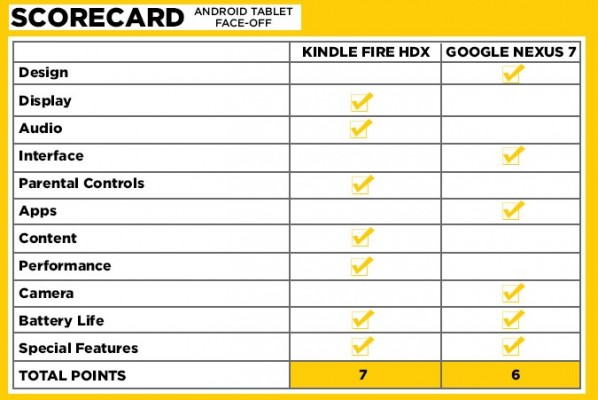Amazon Kindle Fire HDX vs. Google Nexus 7: Which Tablet Is Better?
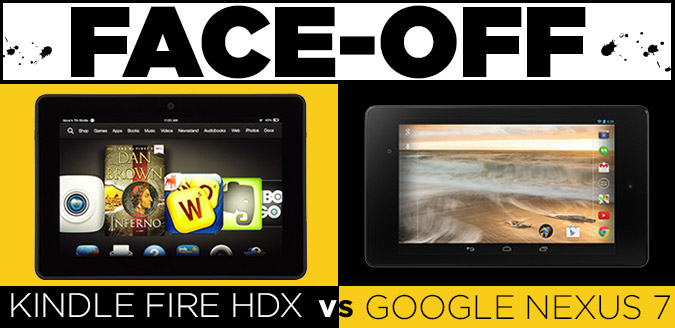
There are lots of 7-inch Android tablets, but two stand above the rest: Google's Nexus 7 and the Amazon Kindle Fire HDX. Both devices start at $229, and both feature sharp, full-1080p displays. Plus, both tablets earned Editors' Choice awards. So how is one to choose?
To crown a 7-inch slate champ, we put the Nexus 7 and Kindle Fire HDX head-to-head — comparing design, display, audio quality, parental controls, interface, apps, content, camera, performance and secret weapons — to help you make the right choice.
Design
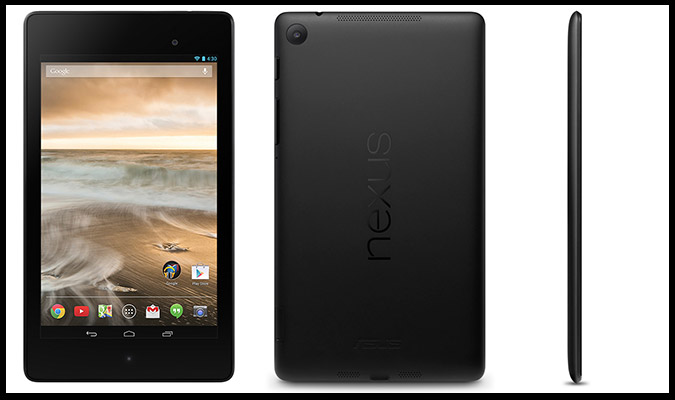
At 7.9 x 4.5 x 0.34 inches and 10.24 ounces, the new Nexus 7 is narrow and slim. Its simple, rectangular shape makes it very easy to hold one-handed in portrait mode. Measuring 7.3 x 5 x 0.35 inches and weighing 10.7 ounces, the HDX is heavier and thicker, but its angular design is fairly comfortable to hold in landscape mode.
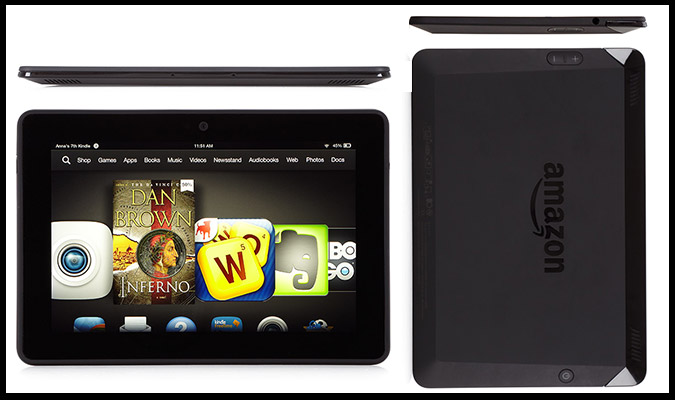
Both devices sport soft-touch backsides with physical power and volume buttons, but Amazon places its buttons on the back, which makes them harder to access.
Winner: Nexus 7. The Nexus 7 is lighter and thinner, and its physical buttons are on the edge instead of on the back.
MORE: Best Tablets 2014
Stay in the know with Laptop Mag
Get our in-depth reviews, helpful tips, great deals, and the biggest news stories delivered to your inbox.
Display
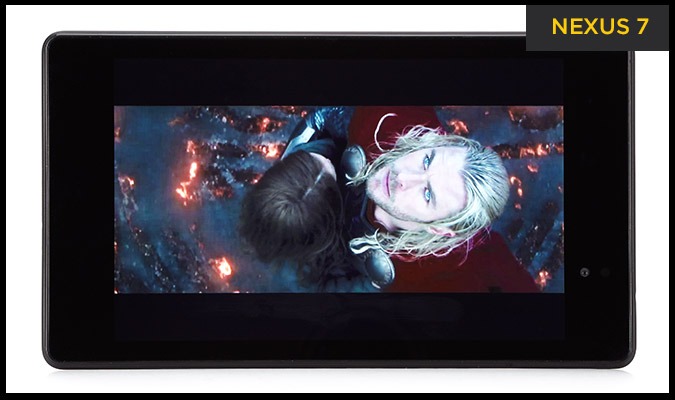
Both the Kindle Fire HDX and the Nexus 7 sport 1920 x 1200-pixel, 7-inch displays. The Nexus 7 offers a little more protection against the occasional drop, thanks to its Gorilla Glass treatment. When we measured the brightness of the two tablets, the Nexus 7's score of 531 lux beat the Fire HDX's 480 lux. However, the Fire HDX's screen looked better in our side-by-side comparison.
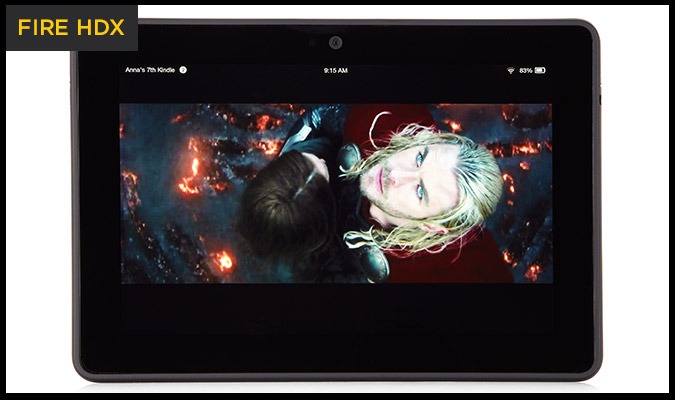
When we watched a 1080p trailer for "Thor," everything looked richer on the Amazon Kindle Fire HDX. The gold on Loki's jacket glinted in the sun with near perfect clarity, and Natalie Portman's skin looked flawless on Amazon's tablet. The Nexus 7's panel looked blue, muddy and darker by comparison. We noticed the same quality difference when viewing photos and websites.
Winner: Kindle Fire HDX. While the Nexus 7's screen shines brighter, we prefer the color and image quality offered by Amazon's tablet.
Audio
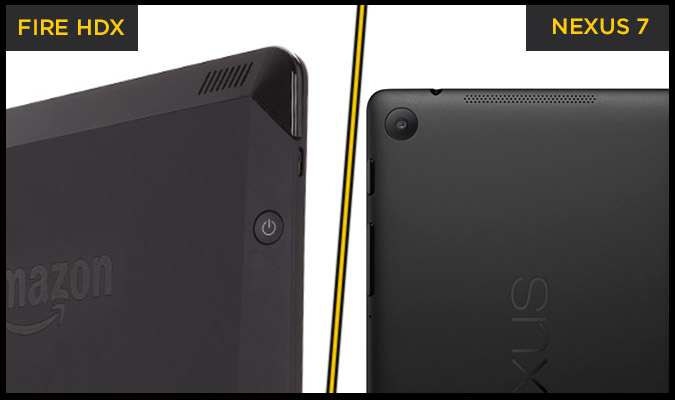
Both the Kindle Fire HDX and Nexus 7 offer stereo speakers. The two speakers on Google's slate line the left and right edges when held in landscape mode. This placement can lead your hands to either muffle the sound or amplify it, if your hand is cupped. On the other hand, the Kindle Fire HDX offers two Dolby-boosted speakers lining both sides of the top. When laid flat, the slant on the top edge of the Fire HDX actually served to amplify the sound.
Sinead O'Connor's voice on "Daddy I'm Fine" sounded fuller and deeper on the Dolby Plus-powered Fire HDX. The drums even sounded crisp. On the Nexus 7, the same song sounded flat and distant. Similarly, Sacha Baron Cohen's voice of King Julian XIII on "I Like to Move It" sounded as if it were coming to us from underwater.
On our LAPTOP Audio Test, the Fire HDX speakers pumped out audio at a loud 77 decibels. We had no problem filling a small room with quality sound. The Nexus 7 registered just 73 decibels.
Winner: Kindle Fire HDX. Amazon's tablet consistently delivered louder and crisper sound.
MORE: 25 of the Best Free Apps for Android Tablets
Interface
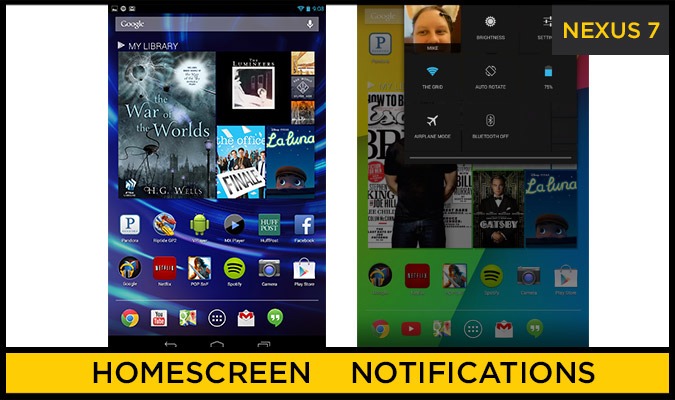
Android users will feel right at home with the Nexus 7, as it runs a pure version of Google's operating system. It's also the first device to run Android 4.3. You're still presented with the same lock screen as that offered by Jelly Bean 4.2, which means you can unlock the Nexus 7 to the home screen or directly to Google Now, but not to the camera or app of your choice. We love that the look and feel of Android can be customized. Everything from widgets to wallpapers can add personalization to your tablet.
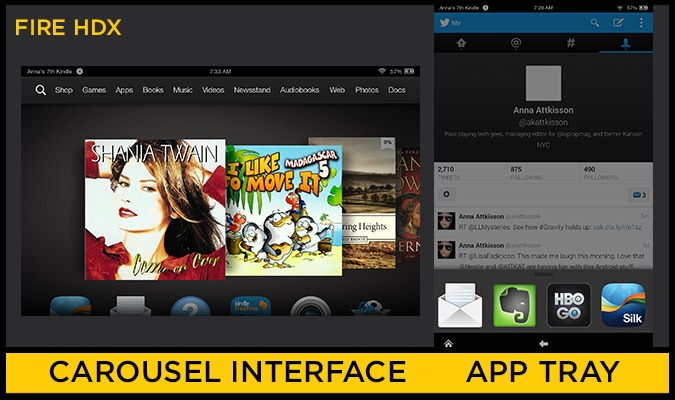
On the other hand, the Kindle Fire HDX is the first device to run Fire OS 3.0 Mojito. The look and feel of the interface are very similar to those on the previous generation of Kindle Fires. While the OS is based on Android, the Amazon skin is very different. We're not big fans of the carousel of recently opened apps that sits at the top, nor the overly large icons. The aesthetic screams "newbie," but first-time tablet owners may appreciate it.
However, we are fans of the new app tray that pops out of the right side of any open app. This makes it easier to go from app to app without returning to the home screen.
Winner: Nexus 7. The customization options and pure form of Android are easier to use and navigate, especially for Android phone owners.
MORE: 12 Worst Android Annoyances and How to Fix Them
Parental Controls
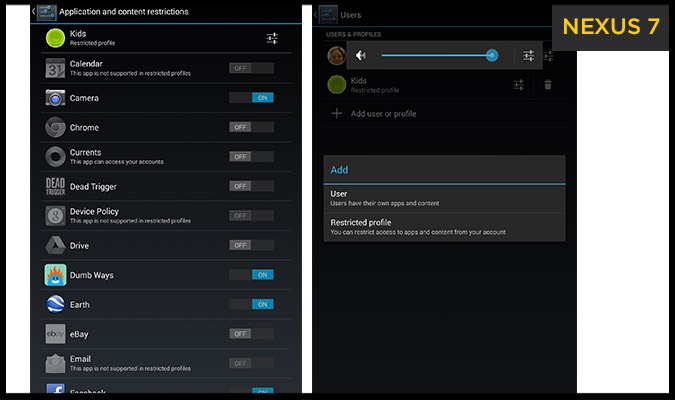
While multiuser support was available on Android 4.2, on the Android 4.3-powered Nexus 7, this feature now includes the ability to set specific limitations for each profile. For example, when we created a restricted profile for little Bobby, we could specify which apps he could access. By default, all are turned off. Some apps, such as Email and Gmail, are not supported in this mode. And a few apps, such as Google Movies & TV, allow you to set more restrictions on app access. In that specific example, you can allow all movies that are not rated NC-17 or TV shows that are not rated MA. Or, you can disallow access to the app altogether.
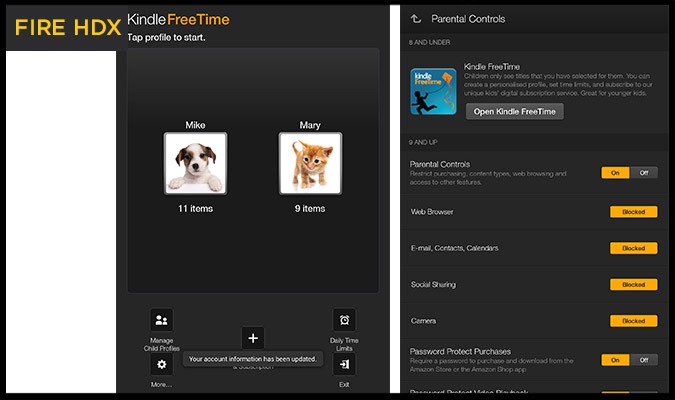
Amazon's parental controls are much more robust. The Kindle FreeTime feature lets parents create profiles for different children and hand select what books, apps, games and videos their kids can access. We especially appreciate that parents can set daily limits for tablet use, or restrict specific categories of content, such as games and movies. Children can also add their own personalization by customizing things like the background color.
In FreeTime mode, children are blocked from buying new content, accessing the Web browser, sharing via Facebook or Twitter, or using any location-based services. FreeTime also requires that your child enter a password before gaining access to Wi-Fi or in-app purchases.
Amazon is now offering a subscription to kid-friendly content called Kindle FreeTime Unlimited. For $2.99 per month, parents can automatically provide their children safe access to age-appropriate (ages 3 to 8) books, games, apps, movies and TV shows on their own profiles. The content comes from such well-known sources as Disney, Nickelodeon and PBS.
Winner: Kindle Fire HDX. Amazon simply offers parents more control over what their children are allowed to use and for how long.
Apps
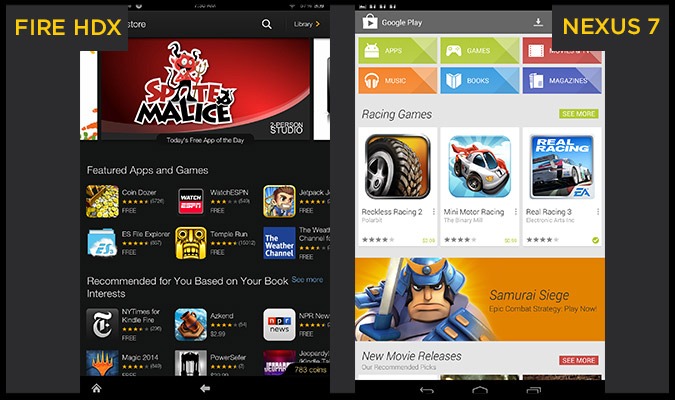
Kindle Fire HDX owners will not be able to access the Google Play store, but Amazon does offer its own curated Android app store with more than 100,000 apps and games. While the selection isn't huge, there are some solid staples, such as "Angry Birds Star Wars II," Evernote, Facebook, HBO Go, Netflix and many others. However, the lack of access to Google services and apps — such as Chrome, Gmail, Google Maps and Drive — is a big drawback.
The Nexus 7 accesses all 900,000-plus Google Play store apps. But it's worth noting that a small portion of these choices are optimized for tablet use. All Kindle Fire apps are intended for use on a tablet.
Of the top 25 free apps in the Google Play store, you'll find 17 in the Amazon app store. Of the top 25 paid apps, you'll find only 13 for the Fire HDX. Apps you won't find for the HDX include Snapchat, "Candy Crush Saga," Instagram and Beautiful Widgets.
Winner: Nexus 7. The tablet not only taps into Google's plethora of services but many more third-party apps.
MORE: Best Apps 2014
Content
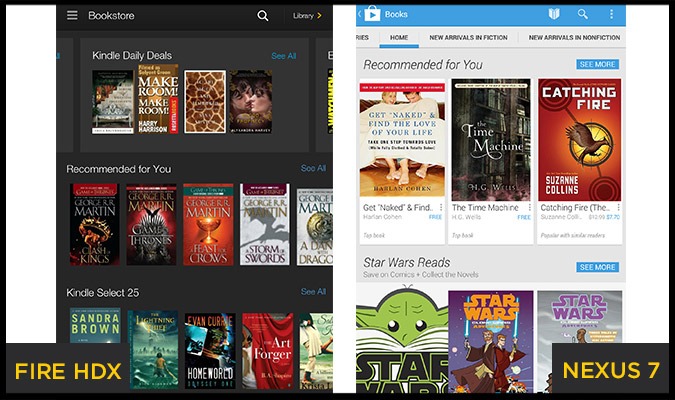
Both the Google Play store and the Amazon store offer their own catalogs of books, movies, TV shows and music. However, not all stores are created equal.
As you'd expect from a bookseller, Amazon's e-book titles number in the millions, but Google claims to have the largest library in the world. We suspect this is due to the number of free, public-domain books available to Google. We checked both stores against The New York Times' fiction e-books list. Amazon carried all 10, seven of which were less expensive than in the Google Play store. The Play store only carried nine of the 10, and a couple cost more than $2 more than they did in the Amazon store.
Both stores offer millions of songs, and when we looked for Billboard's top 10, we found all 10 in both stores for $1.29 each.
Based on the top 10 best-selling DVDs of the year, we found Amazon had an edge. We couldn't find "Rise of the Guardians" for rent or purchase on Amazon, but we couldn't find "Les Misérables" on Google Play. What we did find was that in several instances, Amazon offered both high- and low-resolution versions of movies for purchase or for rent. The only rentable option for the Nexus 7 among those top 10 movies was "Twilight: Breaking Dawn," but there was no option to buy that movie via Google. Amazon offered both a rent and buy option for that film.
MORE: Top 10 Tablets to Buy (or Avoid) Now
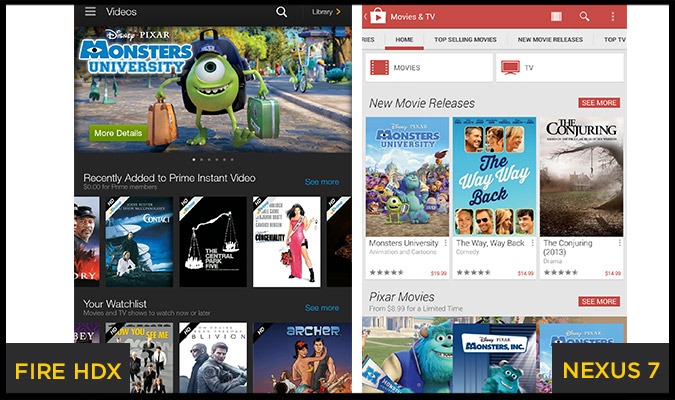
A huge perk for Kindle Fire HDX owners is Amazon Prime. By being a member, which costs $79 annually, you can borrow books from the Kindle Owners' Lending Library for free once a month, with no due date. Plus, Prime members can stream unlimited commercial-free movies and TV shows. And for physical goods, members get free two-day shipping. Amazon is now offering a 30-day free trial of this service.
When it comes to movies and TV, Prime members get access to thousands of popular movies and TV shows, such as "The Hunger Games," "Under the Dome" and "SpongeBob SquarePants." Prime Instant Video movies and shows now can even be downloaded for offline viewing.
Winner: Kindle Fire HDX. The Kindle offers a better content selection and better prices for media, plus gobs of free content for Prime members.
Performance
Packing a 1.5-GHz Qualcomm Snapdragon S4 Pro processor, 2GB of RAM and a 400-MHz Adreno 320 GPU, the new Nexus 7 offers impressive performance. But the Fire HDX has even more horsepower, thanks to its 2.2-GHz quad-core Snapdragon 800 with 2GB of RAM and the same GPU.
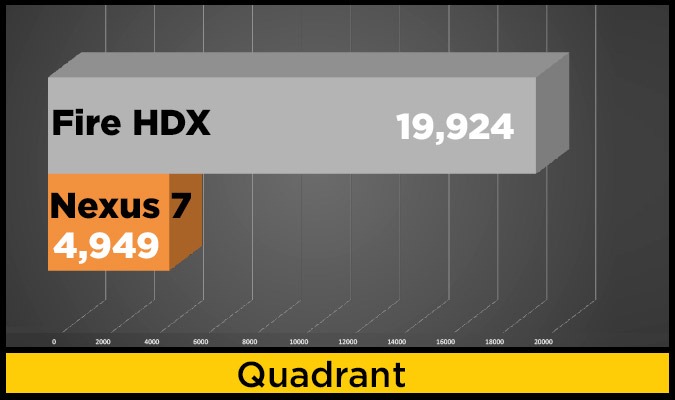
On Quadrant, which measures overall performance, the new Nexus 7's score of 4,949 was a far cry from the Fire HDX's 19,924.
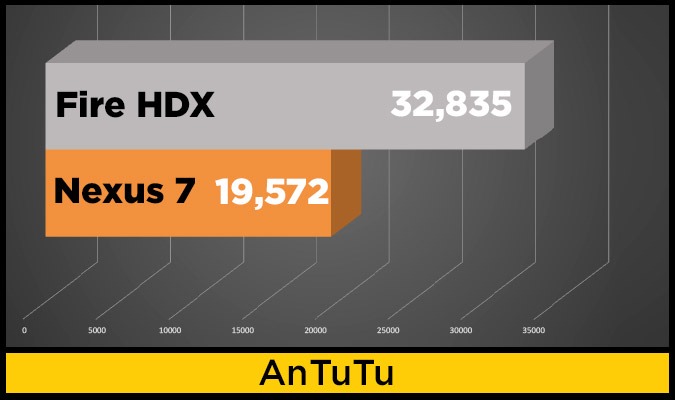
Similarly, the Fire HDX obliterated the AnTuTu average of 7,491 by scoring a mind-boggling 32,835. AnTuTu measures memory, CPU, graphics, SD Card read/write and database I/O performance. In comparison, the Nexus 7 scored 19,572.
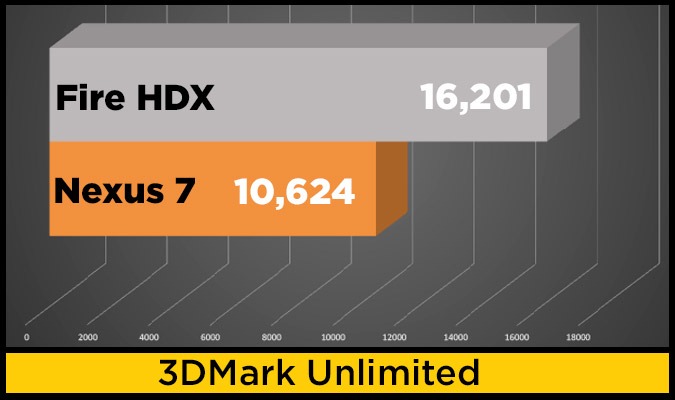
In the same vein, the Fire HDX scored 16,201 on 3DMark Unlimited, which measures graphics performance, while the Nexus 7 scored just 10,624. The category average is 5,804.
In real-world performance, we opened "Despicable Me: Minion Rush" in 28 seconds on the Fire HDX, and the Nexus 7 took 30 seconds. The Fire HDX also switches orientation a hair faster than Google's 7-inch tablet. Both tablets instantly close and return to the home screen and flip through screens smoothly.
MORE: How to Backup Your Android Device
We played "Riptide GP2" on both tablets, and they each offered enhanced water effects. "Minion Rush" gameplay was equally smooth on both tablets.
We also measured how long it took the two tablets to convert a 204MB 1080p .MOV file to 480p using VidTrim. The Kindle Fire HDX required only 4 minutes and 42 seconds. The Nexus 7, on the other hand, took a relatively lengthy 6:42. They both still beat the 10:58 category average.
Winner: Kindle Fire HDX. Amazon has the edge because of the HDX's higher-octane CPU.
Camera
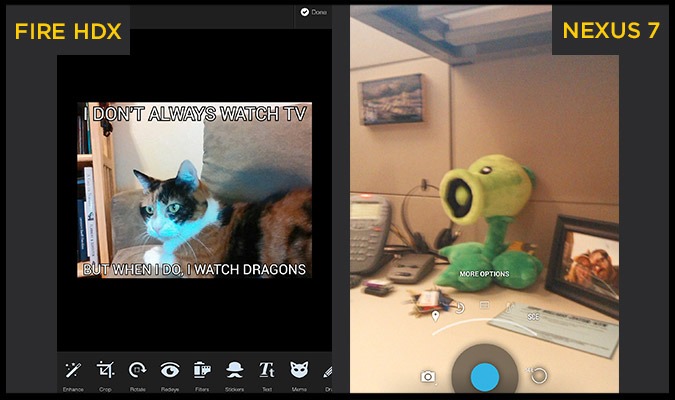
The new Nexus 7 has a rear 5-MP camera to go along with the front 1.2-MP shooter. A picture of a cat captured indoors with the back camera offered a fair amount of clarity, but its orange fur looked almost yellow in places. However, a 1080p video shot outside a passing car looked colorful, crisp and smooth. A still taken with the front camera looked washed-out and lacked detail.
The camera app on the Nexus 7 offers minimal settings, but we love the Photo Sphere feature, which takes Panorama mode to a new level. You can take a hemispherical image in a few easy steps. We were very impressed with how quickly the Nexus 7 stitched the shots together — usually no more than 15 to 20 seconds. From the tablet, you can also add filters or frames, crop, or correct for contrast, sharpness or saturation.
The Kindle Fire HDX lacks a back camera, and the front camera shoots 720p. Selfies taken in our New York City offices looked grainy and lacked definition. A shot of our cat was equally awful.
The Photo app lets you do all sorts of fun things after you shoot. There are filters and exposure-correction options, and you can also create a meme, add text to pictures, add stickers, and even correct red eye. We can see how storing Facebook pics or other photos in Amazon's Cloud Drive would be useful, because you can edit your pics on the Fire HDX.
Winner: Nexus 7. It is neat that you can so extensively edit photos on the Kindle Fire HDX, but only the Nexus 7 has a back camera.
Battery Life
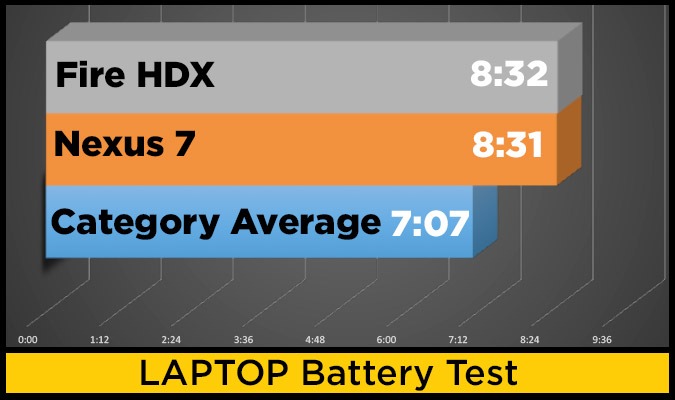
Amazon claims that the Kindle Fire HDX will get 11 hours of battery life during mixed use. The company also says that when the HDX is just used for reading, it is smart enough to power down unused system components, which could extend its endurance to 17 hours.
On the LAPTOP Battery Test (Web surfing via Wi-Fi), the HDX lasted 8 hours and 32 minutes. That’s nearly identical to the Nexus 7 (8:31) and about 1 hour and 20 minutes longer than the category average (7:07).
Winner: Tie. With scores that close, it's impossible to call a winner in this round.
MORE: 10 Tablets with the Longest Battery Life
Special Features
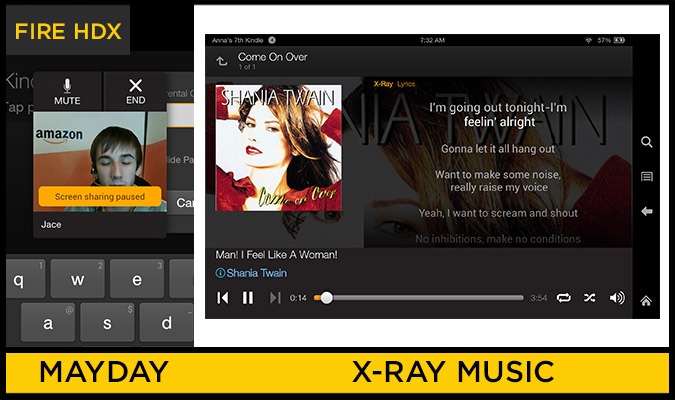
Amazon's Kindle Fire HDX offers quite a few features that you won't find elsewhere. In the drop-down settings menu of the Fire HDX, a Mayday button provides instant access to 24/7 live tech support. After pressing a prominent Connect button, a support specialist named Jace appeared nearly instantly in a small box on our screen. He could access and control our tablet, which we found helpful. We could also manually move Jace's head around the screen to keep him from covering important answers.
Jace was friendly and helped us set up a user profile in FreeTime. The whole call took less than 4 minutes. Some people may find this feature intrusive, but it's comforting to know the tech support agent can't see you.
Within its media section, Amazon offers another secret weapon: the X-Ray feature. X-Ray was previously available for books and movies, but with Fire OS 3.0, Amazon extended the functionality to its music store. The idea behind X-Ray is that you can get extra information on the media you're enjoying. For books, this means getting a CliffNotes-like look at the appearance of various characters or themes within a story — a tool that could be helpful for writing a paper.
MORE: 5 Best Keyboard Apps for Android
The music version of this feature is different. When we listened to "I Will Wait" by Mumford & Sons, the lyrics streamed along the right side of the screen. Any fan of karaoke will appreciate this addition. X-Ray for video, on the other hand, syncs with IMDb's database. By tapping the screen while watching "Django Unchained," we pulled up bios on the actors in any given scene. Other fun features include general trivia and the ability to navigate flicks by skipping to various songs played during the movie. (Yes, you can buy the tracks through Amazon.)
Amazon has added another reader-friendly feature: Immersion Reading. The Kindle Fire HDX can synchronize Kindle text with companion Audible audiobooks, highlighting the text as it is read by a professional narrator. While we could see this feature being helpful for children, we're not sure who would want to have a book read to them as they read.
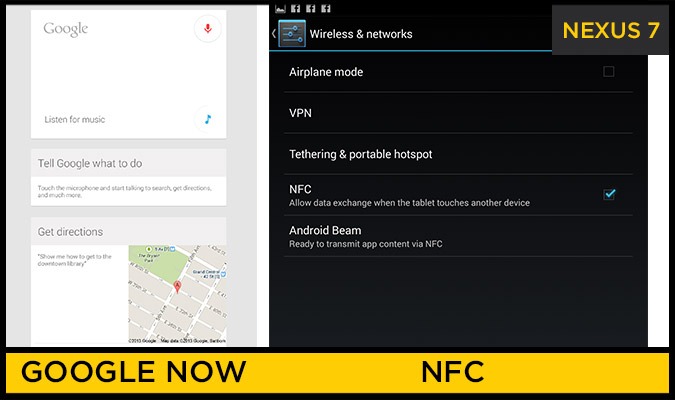
The Nexus 7 also has some cool tricks up its sleeve. Google Now is a powerful tool that Amazon doesn't offer on its tablet. Among other things, Google Now can tell you sports scores and the weather forecast, offer directions, set reminders, show your calendar, translate words and help with currency conversion.
You access Google Now by dragging your finger up through the Home button toward the bottom of the screen. Simply say "Google," or touch the microphone icon, to activate the voice recognition. We found the voice-recognition flawless and smart. For example, when we asked, "How did the Giants do?" followed by "How about the Jets?", we got the most recent score for the latter team.
Google Now can also anticipate what you need to do and present relevant information. For example, it can show you how long it will take to get the next meeting in your calendar. Google Now can also provide your flight status, remind you of dinner reservations and give you the scoop on local attractions.
Built into the hardware of the Nexus 7 is another hidden feature: an NFC radio. That means you can use Android Beam to wirelessly beam a Web page, a video or other content from your screen to another device by bringing the devices together (typically back-to-back).
Winner: Draw. The Fire HDX's Mayday is a killer feature for anyone who needs tech support. That, coupled with X-Ray and Immersion Reading, makes this an excellent content-consumption device. However, Google Now is a handy tool we see Nexus 7 owners using more often.
Overall Winner: Amazon Kindle Fire HDX
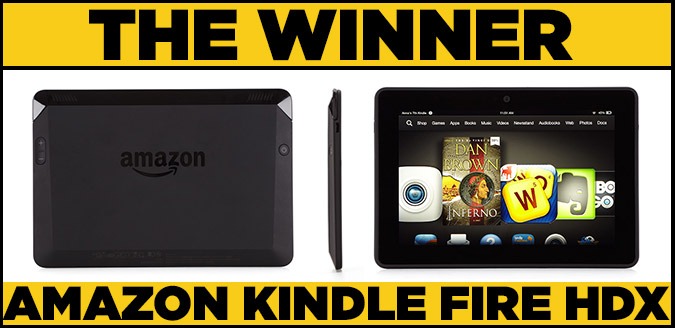
In a very close battle, the Kindle Fire HDX wins this face-off 7 rounds to 6. The HDX is the ultimate content-consumption tablet, offering a better HD display, crisper audio, and a more robust selection of video, music and books. HDX buyers will also appreciate the excellent parental controls and Mayday feature for quick access to tech support right on the device. Amazon's tablet has the speed advantage, too, thanks to its Snapdragon 800 processor.
However, Google's tablet benefits from a thinner and lighter design, an interface that's more familiar to Android phone owners, and a back camera. Plus, Google Now puts tons of useful information at your fingertips. The Nexus 7's biggest advantage is its wider array of apps in the Google Play store and access to Google apps such as Gmail, Google Drive, Google Maps, YouTube and others the Kindle HDX lacks.
It all comes down to what you're looking for in a 7-inch slate. If you want the most apps, the Nexus 7 is the device to get. But the HDX is the better pick for parents, tablet newbies and (if you're an Amazon Prime member) those who want to enjoy a wealth of free content.
